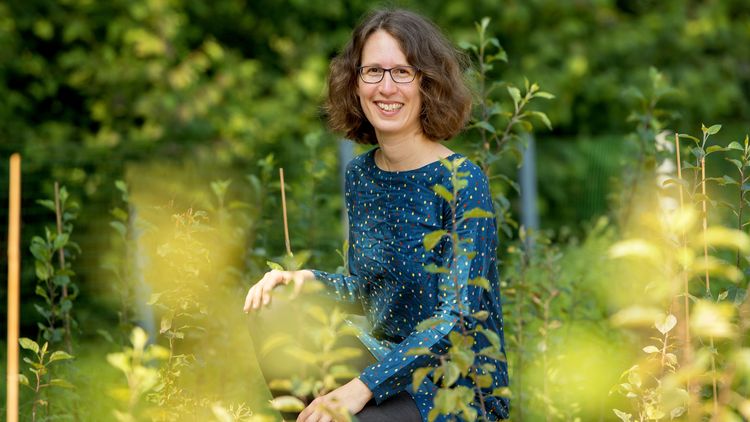Stefanie Sievers-Glotzbach researches how commons-based rights on seeds and plant varieties can make plant cultivation more socially and ecologically sustainable – and help to future-proof agriculture.
Even in school Stefanie Sievers- Glotzbach was already interested in scientific and social issues. As a student she became involved in a food cooperative and other volunteer groups. Her personal interest soon turned into a scientific one. After studying Environmental Sciences in Luneburg she wrote her PhD on how to use natural resources to improve both global justice and intergenerational justice. But in the long run the young scientist found the research approach too theoretical; she wanted to get out of the ivory tower. In 2012, while still writing her doctorate, she was offered an exciting opportunity in the Oldenburg working group Ecological Economics. Here, she worked alongside natural scientists while coordinating a master’s programme in sustainability and supervising a number of seminars.
A few years later she responded to a call for proposals from the Federal Ministry of Education and Research that corresponded with her desire to make a difference in society through research. Her application was successful. At the end of 2016 the 35-year-old and her junior research group “Right Seeds” began investigating the question of whether commons-based rights on seeds and plant varieties can inspire ecological and social change in plant production. The junior professorship for “Economy of the Commons” which she has held ever since is unique in Germany. “Commons research touches on many disciplines, from environmental economics to political science. We are trying to bring them all together,” says Prof. Dr. Stefanie Sievers-Glotzbach.
Rediscovering the commons
What constitutes the commons and how they should be defined is a much-discussed topic. The term was originally used to refer to scarce natural resources such as pastureland or fish stocks and the rules drawn up for their collective use. “Until the start of the twentieth century seeds, too, were kept by farmers as a common
good, swapped and developed further on the fields,” Sievers-Glotzbach explains. Nowadays plant cultivation is largely a commercial system based on biotechnological methods, non-reproducible seeds and patenting, she says. As a result the diversity of cultivated crops is diminishing, farmers become dependent on seed companies and there are very few species adapted to adverse growing conditions and organic farming.
“In reaction to these developments a growing number of initiatives have been launched that return to the commons approach,” Sievers-Glotzbach explains. This means that all involved share their knowledge with one an-other, establish a set of common rules on seed use and forgo protectionism of their own varieties. The participating actors are organised into associations and networks, and there are also food retailers who are interested in the is-sue, and of course NGOs and advocacy groups. This is where the RightSeeds scientists come in, connecting ecological, political, economic and ethical analyses and working together with practice partners – including a network in the Philippines. The international exchange that takes place here – also with fellow researchers – is something Sievers-Glotzbach values greatly.
Improving the resilience of agricultural systems
She herself is primarily responsible for the conceptual framework of the project. In her research she examines the resilience of agricultural systems – how resistant they are to problems such as climate change, disease or price changes. Sievers-Glotzbach is working on the assumption that commons-based plant breeding has an advantage over private enterprises: “Breeders and seed producers work
together more closely and also include farmers in the process. The plant varieties are primarily cultivated in their natural environment.” As a result, the actors are more flexible and independent and the plants are better adapted and therefore more resistant. Since farmers can cut down on the use of plant protection products or fertilizer, this approach is particularly attractive for organic farming.
The second question that Sievers- Glotzbach is looking into is whether these initiatives can promote a wider shift towards sustainability that encompasses society as a whole. “On the one hand I want to find out whether they have a transformative character,” she says. This is the case when actors question societal paradigms by deciding not to follow the imperative of economic growth, for example, or develop new varieties in the field in-stead of in the laboratory, she explains. “We are also investigating the concrete transformative impact. For this we look at how the initiatives influence political processes,” the expert says, pointing out that there are a number of NGOs that are campaigning for EU seed regulations to be changed in order to facilitate registration procedures for organic varieties. In the EGON project, funded by the Volkswagen Foundation’s “Niedersächsisches Vorab” research initiative, Sievers-Glotzbach is working on similar issues. Together with colleagues from various working groups she is researching the develop-ment of organically grown fruit varieties in commons-based initiatives.
When she has the time the researcher actively supports projects like book-swapping cupboards or food sharing. In Oldenburg, she says, it’s easy to shop sustainably: “We have boxes of vegetables delivered by the organic shop for instance,” she explains. But there’s no point being too strict about this, she adds. “I’m not always entirely consistent either,” she admits.

